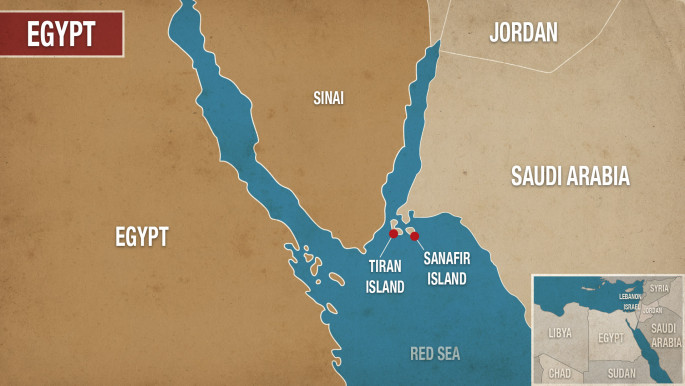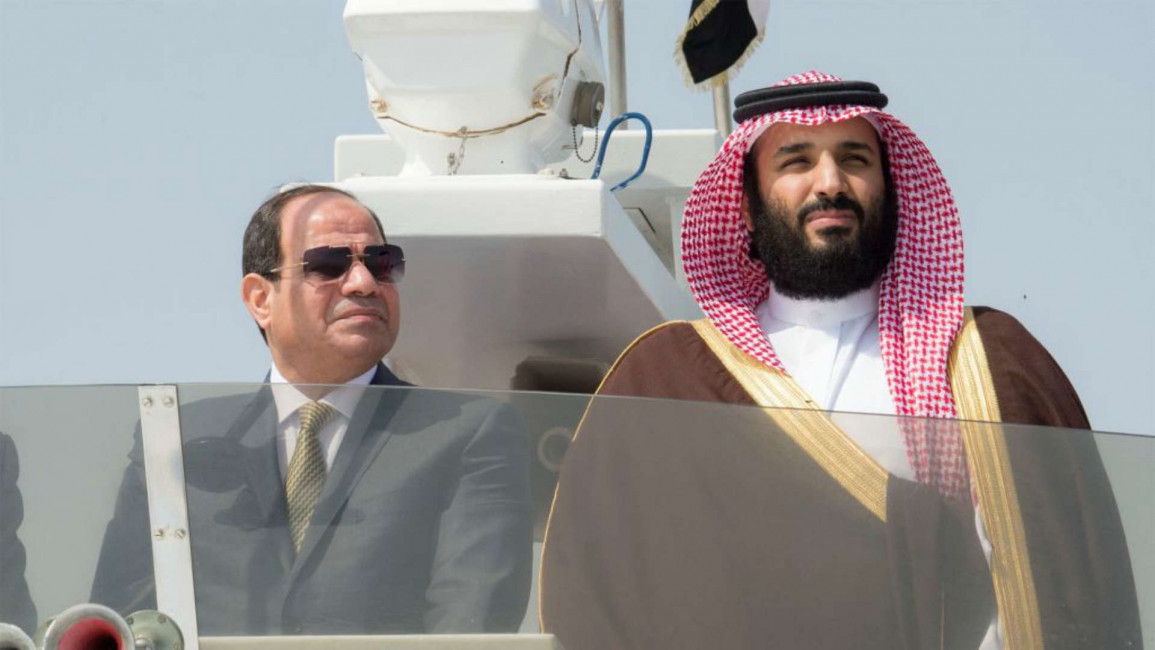
Saudi megaproject harnesses Egypt's Sinai, but Sisi will pay the price
A neologism based on the Greek root "neo" meaning "new" and the Arabic word "mustaqbal" meaning "future," Neom is being hyped as bringing a "new future" to the northwest region of Saudi Arabia, centred on Tabuk and adjacent territory in Jordan and Egypt.
One thousand square kilometres of South Sinai land is to be devoted to the project, along with additional territory in Hurghada bordering the Gulf of Aqaba.
The core of Neom is to be a constellation of super-modern cities utilising robotic and other 21st century technologies, combined with tourist facilities spreading inland from the Red Sea, Gulf of Aqaba and Gulf of Suez coasts.
The almost 11,000 square mile total project is to be designed and supervised by US, German, Japanese and possibly other western experts. It represents the largest single component of the Saudi Crown Prince's "Vision 2030", by which he intends his country to diversify its economy away from dependence upon oil.
Egypt, in other words, is being harnessed to Prince Mohammad bin Salman's project to consolidate his personal political power, transform the Kingdom into a centre of high tech development in what heretofore has been a relatively peripheral region within the Middle East, and exert yet greater Saudi influence over both Jordan and Egypt.
 |
Will Neom prove to be a profligate pie in the sky? |  |
The initial step in this plan was for Saudi Arabia to gain control of Sanafir and Tiran Islands, thereby opening up its access to the western shores of the Gulf of Aqaba and Red Sea. The recent Egyptian court decision that approved this transfer of sovereignty thus removed the last obstacle to the Neom project being extended into Egypt.
Leaving aside the issue of whether or not Neom presages a brilliant new future for the Kingdom and its heir apparent, or will prove to be a profligate pie in the sky that could undermine his pretensions, the question of the costs and benefits to Egypt now confronts that country. The most immediate, tangible potential benefits are to lend support to the effort to convert the Suez Canal Zone into a globally important logistics hub, combined with opening up the Red Sea and Gulfs of Suez and Aqaba to a new surge of tourist development.
Questions can be raised about the viability of both objectives. Suez Canal revenues and numbers of ships transiting have been essentially flat since the parallel channel was opened amidst great fanfare in February 2016 following a two-year, $8.4 billion upgrade.
Read more: Egypt's Sisi a 'traitor' for handing over islands to Saudi Arabia
Lack of growth of Canal revenues cannot be attributed any longer to a slowdown of the global economy. Instead, less episodic factors seem to be at work. One is the substantial reduction in oil tanker traffic passing from the Gulf to the Mediterranean and then on to North American markets resulting from the dramatic expansion in American oil production.
Another is the lower cost of bunker fuel. Still another is the widening of the Panama Canal and its capture of greater market share. A fourth factor soon likely to have a major negative impact on traffic is the opening of new shipping routes, one being the Arctic passage from Asia to North America and Europe, the other being China's mainly overland One Belt, One Road initiative.
But even if Suez Canal traffic were miraculously to increase, the benefits of a major logistical hub on its flanks are less than certain.
Neither Egypt nor any other Middle Eastern or North African country is a major manufacturing centre. Intra-industry trade, which is that essentially conducted within multinational corporations as they integrate production of goods in many countries, is abysmally low in the Middle East and North Africa, whereas it is booming in East Asia.
So the question of what purpose a logistical hub would serve is highly pertinent.
 |
|
China appears to have no interest in further offshoring manufacturing from Asia, while Trump's America is devoted to bringing manufacturing home. Cheap labour is no longer a major attraction for siting manufacturing enterprises. If a logistical hub is not to serve as a node in a manufacturing network, what purpose would it have?
The Egyptian authorities have yet to provide an answer to this question.
Whether it is reasonable to expect a major growth of tourism into the area is another unanswered question.
Although the Red Sea certainly provides attractive maritime and coastal environments, cruising it would hardly be the equivalent of doing so in the Mediterranean with its wealth of historic destinations.
 |
Investing billions of dollars in tourist facilities in the greater Red Sea region seems on the face of it to be a risky proposition |  |
Moreover, the Red Sea is not exactly a hospitable political environment. The ongoing war in Yemen, increasing instability in Eritrea and Ethiopia, persisting violence in Somalia and Egypt, protracted conflict in Sudan and South Sudan, piracy, and growing competition for port access between the UAE, Saudi Arabia, Djibouti, China, the US and others contain the seeds for turmoil that could negatively impact tourism in the region.
Large tourist vessels and hordes of tourists in these locations could be anticipated to invite unwanted attention which in turn would send insurance premiums sky high. Investing billions of dollars in tourist facilities in the greater Red Sea region seems on the face of it to be a risky proposition.
What benefits then might Egypt anticipate from the reported $10 billion investment?
The principal one seems to be contracts for military owned or associated construction companies, just as was the case with the digging of the parallel channel to the Suez Canal.
Indeed, just as in that case when there was no feasibility or environmental impact study, so in this case it seems that assessments of long term benefits and impacts are of little import to Egyptian decision makers.
 |
Neom wires MbS into the Egyptian military and the patronage networks that sustain it |  |
As military men they are interested in generating business for that sector of the economy they have come to control. From their perspective the $10 billion is not an investment in Egypt's future so much as it is a payment to the Egyptian military for being supportive of Mohammad bin Salman and his ambitions.
The associated costs of what appears to be a large scale, military dominated construction project are economic, environmental and political.
A diversion of resources away from potentially more productive economic activities is a likely opportunity cost, just as was the digging of the second channel of the Canal. Existing tourist facilities already far outstrip demand and after years of disuse are in need of expensive repairs and upgrade.
Turning military owned and associated construction companies loose in the southern Sinai and along the foreshores of the Gulfs of Aqaba and Suez is a recipe for environmental disaster, as the current situations on the Mediterranean North Coast and western shore of the Gulf of Suez attest. The fragile marine environment has already sustained enormous damage to reef and other aquatic life.
Finally, the political cost of tying Egypt to Mohammad bin Salman's Saudi Arabia is unknown, but potentially high.
 |
Turning military owned construction companies loose in the southern Sinai is a recipe for environmental disaster |  |
Whether he will stay the course is an open question, as is what would happen were he to be pushed aside. Neom is his flagship project, so if he falls, so presumably does it.
If he stays and consolidates power, on the other hand, what political leverage does Neom in Egypt provide him?
Presumably quite a lot as it wires him into the Egyptian military and the patronage networks that sustain it. He presumably would be tempted to use that leverage for geo-political purposes, such as insisting that Egypt support his various regional campaigns, whether against Qatar, Yemen, Iran, or whoever.
At the least he would expect Egyptian support in his internal struggles against princely opponents.
He is, in other words, buying Egyptian political insurance for his $10 billion, a price that Egypt may ultimately find to be very high. The future does not look so new after all as Neom seems a neologism that is both internally redundant and externally, at least as far as Egypt is concerned, very similar to previous subventions to its rulers.
Robert Springborg is the Kuwait Foundation Visiting Scholar at Harvard University's Middle East Initiative, Belfer Center. He is also Visiting Professor in the Department of War Studies, King's College, London, and non-resident Research Fellow of the Italian Institute of International Affairs.
Opinions expressed in this article remain those of the author and do not necessarily represent those of The New Arab, its editorial board or staff.



